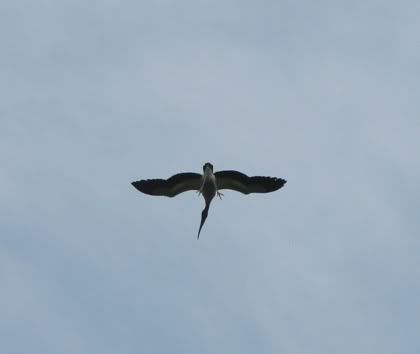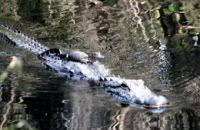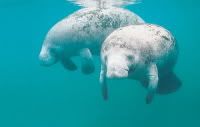
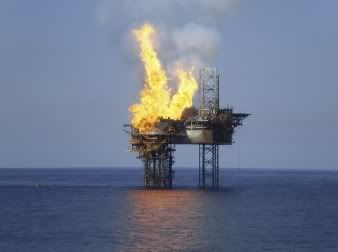
On Nov. 3, the West Atlas oil rig burns about 150 miles off Australia's northwest coast. Environmental concerns about the industry deepened last year after the fire burned unchecked for more than 2 months while millions of barrels of oil spilled into the sea.
Could oil-spill disaster happen in Florida? Aussie rig debacle offers lessons (includes reader poll)
By Kevin Spear
Orlando Sentinel
March 28, 2010
As the nation's top regulator of offshore drilling, Elmer "Bud" Danenberger was nearing retirement last year when he began to get word of a major rig accident halfway around the world.
An Australian oil well blew out at dawn Aug. 21, gushing yellow-green crude into the Timor Sea along the country's northern coast. And it wasn't letting up.
Though 10,000 miles away, the spill would quickly play into Florida's emotional debate over whether drilling rigs similar to the fated one down under should be permitted within sight of the Sunshine State's sugar-sand beaches.
And for good reason: The Aussie debacle lasted more than 10 weeks, spewing millions of gallons of oil into the ocean. As a result, it is giving Floridians a raw and apt look at the scenario they fear most about offshore drilling, thanks in part to an Australian investigation providing an astonishingly detailed chronology of the disaster.
Florida environmental advocates crowed, "I told you so," about the risks of drilling even with the newest rigs available. U.S. petroleum interests, wanting to avoid a black eye for a spill in foreign waters, shot back that the accident was the result of inferior standards and regulations and could not happen in the Gulf of Mexico.
Florida lawmakers were warned two weeks ago, by the author of a Florida think tank's drilling report, that the Australian "rig that was being used appears to be within the class of technologies of the rigs that are being considered for Florida waters."
Last summer, Danenberger grew ever angrier as phone calls and e-mails poured into his Reston, Va., office, about the worsening environmental crisis off the Australian coast. To him and many others, what happened in the Montara offshore oil field was a failure that shook the industry worldwide.
He and others suspect that operations on the rig, named West Atlas, departed from basic international guidelines and that the blowout resulted from a series of bad and avoidable human decisions -- the bane of many complex industrial systems that operate correctly only with a multitude of overlapping safeguards.
A rig worker in his youth, Danenberger had sought for 38 years to eliminate drilling catastrophes in U.S. waters. But when he left his job in January as chief of offshore regulatory programs for the U.S. Minerals Management Service, he knew that the human error involved in the West Atlas accident remains a challenge along any coastline.
"I think people are doing everything they can to prevent that," Danenberger said. "However, nobody can rule out this type of horrible incident."
Drill-ban repeal near
Before it adjourns its regular session at the end of April, the Florida Legislature is likely to consider, in the face of furious opposition, repealing a ban on drilling in the 10.36-mile-wide strip of state-controlled waters in the Gulf of Mexico.
April is also when the Montara Commission of Inquiry is to issue its findings in what could turn out to be Australia's worst offshore-oil spill.
Drilling of the doomed "H1" well began in January 2009, when the then-2-year-old West Atlas rig, owned by a Norwegian company, set up shop in 260 feet of water about 400 miles west of Darwin, capital city of Australia's Northern Territory.
By last May, the "jackup" machine -- distinguished by the three massive legs it stands on while drilling -- was floated away to a new job elsewhere. It left behind a partly completed H1, which had penetrated a high-pressure reservoir of oil and natural gas.
At that point, Danenberger is all but certain, pivotal errors already had been made.
Before the West Atlas jackup departed, its crew had followed the standard procedure of pumping a large slug of concrete to the bottom of the well pipe to prevent escape of natural gas and oil. Several aspects of the "cementing job" most likely were botched, according to testimony in the Montara inquiry.
That doesn't surprise Danenberger, who considers well cementing as much art as science -- and in need of better standards, even in the U.S.
Then another blunder occurred: A redundant plug should have been inserted deep into the well, according to U.S. and international drilling standards, consisting of another slug of concrete or a powerful mechanical device.
The standards followed by the oil company drilling the well -- Thailand-based PTTEP Australasia -- called for such a secondary plug. But the company decided at the last minute -- with hastily given government permission -- to use a pair of screw-on caps at the top of the well instead.
That was inexcusable, according to Danenberger and U.S. drilling engineers, because such devices are best used to prevent corrosion, and not as barriers to control a half-finished well.
"The well design is not one that we would have approved," a top Minerals Management Service official told Congress late last year.
To make matter worse, the crew on the West Atlas jackup somehow neglected to install one of the two caps.
Crisis, then disaster
When the West Atlas crew returned to the H1 well Aug. 19 to complete its plumbing chores, rig workers discovered the missing cap. The screw threads where it should have been attached were badly corroded, but to clean those threads and finish their work on the well, the workers had to remove the second cap.
From there, an emergency began to unfold.
At 5:36 a.m. Aug. 21, H1 burped up as much as 2,500 gallons of oil -- a dangerous occurrence with any oil well -- so West Atlas' 69-member crew prepared to abandon the rig. But then the flow subsided to "bubbles" in the well pipe, so the crew instead scrambled to insert a mechanical plug -- until, at 7:23 a.m., a fountain of oil and natural gas enveloped West Atlas.
Crew members shut off the rig's lights and motors, to prevent them from igniting the flammable spray, and escaped in three lifeboats.
The rig's misfortune continued as efforts were made to choke off an oil flow that might have exceeded 80,000 gallons a day. Well-control experts were barred from boarding West Atlas because of the danger of fire, so the only option was the time-consuming task of drilling a second well, at an angle, to pierce the side of H1's pipe -- a kind of oil-patch Hail Mary.
A second rig went to work 1.2 miles away but failed in four attempts to hit the 10-inch-diameter H1 well pipe at a point more than 8,000 feet underground. It punctured H1 on the fifth try, and workers had begun pumping heavy fluid into the runaway well -- when an unexplained ignition engulfed West Atlas in an enormous blaze.
The blowout and fire were not extinguished until Nov. 3; by then the pipe had spilled, according to some of the widely varying estimates, about half as much oil as the 11 million gallons that gushed from the stricken Exxon Valdez tanker off Alaska in 1989.
Many species in area
Australia's beaches were spared damage thanks to currents that pushed the well's many separate oil slicks out across the Timor Sea. But the spill contaminated a marine wilderness that includes coral and sponge reefs; a rich variety of dolphins, sea snakes, fish and birds; as well as one of the world's largest populations of humpback whales.
SkyTruth, a nonprofit organization in West Virginia that analyzes satellite images to document oil spills, measured the spread of H1 crude at 22,000 square miles -- an area 55 times larger than Tampa Bay.
"These big runaway incidents are thankfully very rare," SkyTruth President John Amos said, "but they always catch people by surprise, and the exact chain of events that causes them are always unique."
Human error?
With the West Atlas jackup, the chain of events wasn't triggered by a failure of advanced technology or an act of nature, such as the hurricanes that devastated Gulf of Mexico rigs in 2004 and 2005. Instead, the Australian inquiry is zeroing in on human error.
During testimony 10 days ago, an Australian government lawyer asked the senior oil-company supervisor on West Atlas about the botched cementing job.
"You were operating at very outer reaches of your knowledge and experience?" the lawyer asked.
"I wasn't out of my depth," the supervisor said. "I just made the mistakes."
Danenberger said drilling rigs have multiple safeguards, so it often takes more than a single mistake to cause injuries or a spill.
"Bad companies can be lucky and never have a thing go wrong, because it usually takes a series of screw-ups that lead to a disaster," he said. "So you get away with it."
"Everybody who works in the industry should study the big disasters," he added: " Santa Barbara, Bay Marchand, Main Pass 41, Piper Alpha, Alexander Kielland, Montara, Ocean Ranger."
Those are among the world's worst offshore-rig accidents, accounting for spectacular explosions, hundreds dead, environments wrecked and, subsequently, more stringent standards.
"We need to study those things all the time," Danenberger said. "I don't know that that's being done."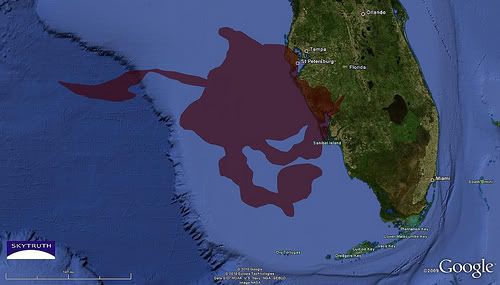
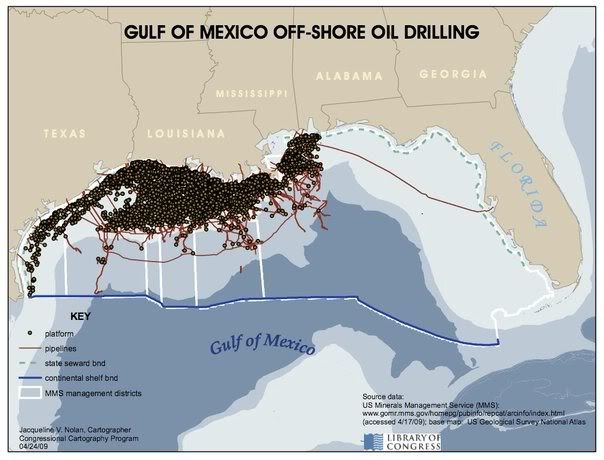
Oil and gas platforms and pipelines in the Gulf of Mexico. Is Florida next?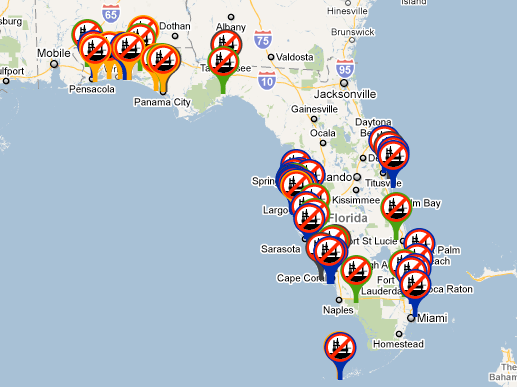
Progress Florida’s Resolved Against Drilling map showing at least 55 cities, counties, chambers of commerce and other local agencies around the state have passed resolutions against opening Florida’s coast to offshore oil drilling.
TAKE ACTION NOW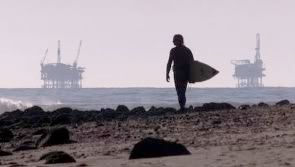
Write Your State Senator: Big Oil's Promises Are "Empty"
Big Oil and their hired hands in Tallahassee have sworn that drilling Florida’s coast would be “invisible” – that there would be no unsightly rigs just a few miles off our coast. We know different – and a recent eye opening story in the Sarasota Herald-Tribune has proven Big Oil’s promises completely “empty.” Click the picture above – keeping the pressure on by letting our State Senators know people like you are paying attention is how we’ll beat Big Oil.
MORE ONLINE ACTIONS
Pass a Resolution To Protect Florida's Beaches Now, via Audubon of Florida.
Urge President Obama’s Ocean Policy Task Force to recommend against offshore drilling within any previously protected coastal waters, via Defenders of Wildlife.
Tell Obama: Offshore Drilling is NOT the Answer to Energy Crisis, via Oceana.
Help Drill for Solutions Not for Oil, via Southern Alliance for Clean Energy.
Let us decide! Petition to Governor Charlie Crist, Senate President Jeff Atwater, and House Speaker Larry Cretul, via Civic Concern.
Contact Your Officials About New Drilling Off Florida's Coasts, via Civic Concern.
Ask your state legislators to keep the rigs out, via Save the Manatee Club.
Write a letter to the editor, via Audubon of Florida.
Write your state legislators, via Audubon of Florida.
Urge Senate President Jeff Atwater to oppose offshore oil drilling, via Progress Florida.
Tell Sen. Atwater Not To Allow Oil Drilling In Special Session, via Audubon of Florida.
Sign the petition against oil drilling, via Protect Florida’s Beaches.
Tell Salazar: No drilling off Florida's Coast, via Environment Florida.
Tell new Senator LeMieux to Repower America, via Environment Florida.
Related action: Don't go drill crazy in the Everglades, via Center for Biological Diversity.
Related action: Keep oil drilling out of climate change legislation, via Oceana.
ADDITIONAL RESOURCES OF NOTE
Hands Across The Sand website; their Twitter page is here.
Protect Florida’s Beaches, recently launched coalition website.
Protect Florida’s Beaches on Facebook.
Think, Baby, Think blog via Protect Florida’s Beaches.
Don’t Drill Florida website.
Don’t Drill Florida Facebook page.
Save Our Shores Florida website; their Twitter page is here.
Floridians Against Big Oil social network.
Save Our Shores Florida Facebook page.
Florida Coastal and Ocean Coalition website.
Environment Florida offshore drilling page.
Southern Alliance for Clean Energy offshore drilling page.
Skytruth blog, an excellent source of info.
Not the Answer blog, courtesy Surfrider Foundation.
Eye-opening map of oil and gas leases and infrastructure in Gulf of Mexico, via MMS.
EnergyFLA.com, online hub of drilling proponents; their Twitter page is here.

Wildwood Preservation Society is a non-profit 501(c)(4) project of the Advocacy Consortium for the Common Good. Click here to learn more.
"it's all connected"

